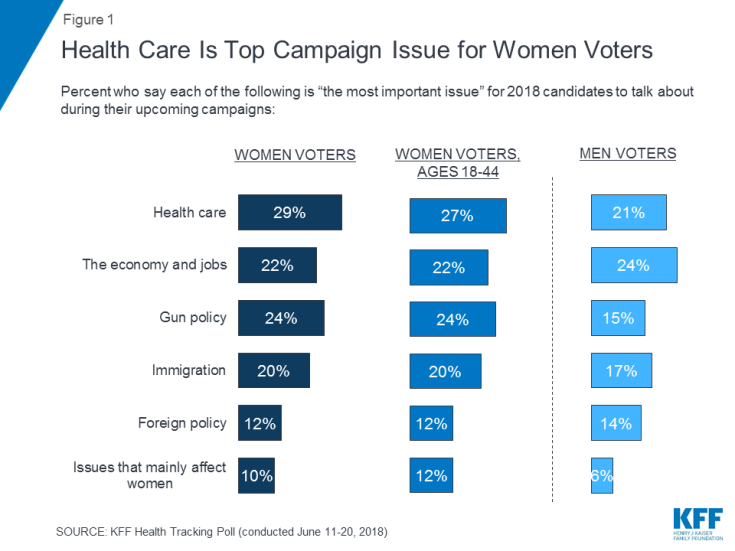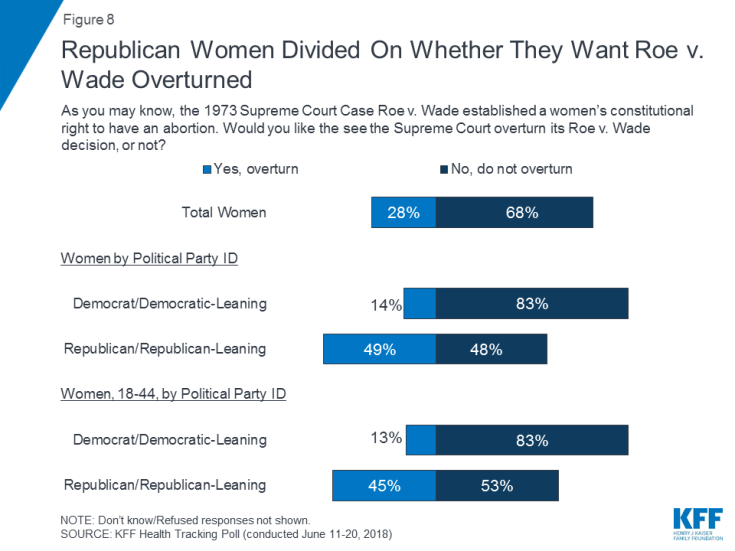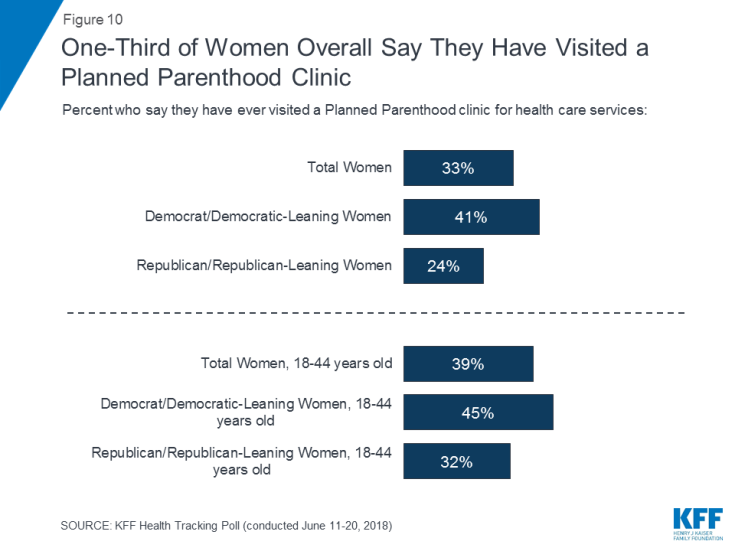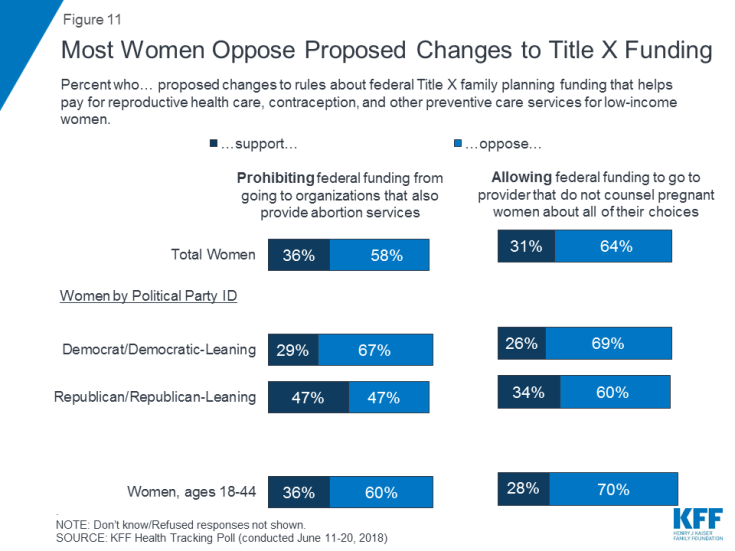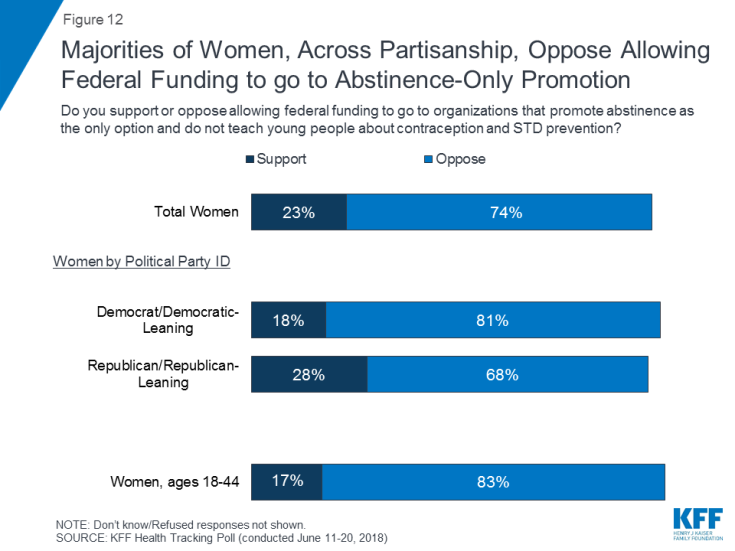Data Note: How Women Voters Could Influence the 2018 Elections and Beyond
While the 2018 midterm elections are still nearly four months away, this election cycle has already been deemed by many as the “year of the woman” with recent attention to the #MeToo Movement and primary wins by female candidates. This, coupled with speculation about what Justice Kennedy’s retirement might mean for the future of abortion access, has placed increased attention on the views of younger women (ages 18-44) and how this unique group of voters could influence the upcoming elections.
Key Findings:
- Expected to be a key voting group in the upcoming 2018 midterms, the poll finds twice as many women voters ages 18-44 saying they are Democrats as saying they are Republicans (43 percent compared to 21 percent). In addition, younger women voters (18-44 years old) are more likely to say they are “more enthusiastic” about voting this year than in previous midterm elections. Four in ten (39 percent) women voters, ages 18-44, say they are “more enthusiastic” about voting in this Congressional Election compared to previous years. In 2014, the last midterm election cycle, 14 percent of women voters ages 18-44 said they were “more enthusiastic” about voting.1
- The poll also examines how 2018 candidates’ positions on key issues such as the international #MeToo movement, access to abortion services, and other reproductive health issues may influence women voters. A larger share of women voters, regardless of party identification or age, say they are more likely to vote for a candidate who supports work-related issues like paid parental leave and enacting harsher penalties for sexual harassment and assault in the workplace or is a proud supporter of the #MeToo movement, than vote for a candidate who does not support these issues or movements. However, considerable shares of Republican women voters say a candidate’s stance on these issues will not play a role in their vote choice.
- When it comes to the role that abortion may play in the 2018 election, there are sharp partisan divides. Most Democratic women (73 percent) say they are more likely to vote for a candidate who supports access to abortion services while nearly six in ten Republican and Republican-leaning women voters say they are more likely to vote for a candidate who wants to restrict access to abortion services. Yet, younger Republican and Republican-leaning women are split on whether they think Roe v. Wade should be overturned.
Health Care Is Among Top Issues in 2018 for Women
Health care is the top issue that women voters overall, and women voters between the ages of 18 and 44 want to hear candidates talk about during their 2018 congressional campaigns. Three in ten women voters (29 percent) say health care is the “most important issue” for 2018 candidates to discuss during their campaigns, which is slightly larger than the share who say the same about gun policy (24 percent), the economy and jobs (22 percent), and immigration (20 percent).2 Fewer say the same about foreign policy (12 percent) and issues that mainly affect women (10 percent). This is similar to the ranking of issues among women voters 18-44 years old, with one-fourth (27 percent) saying health care is the “most important issue” for candidates to be discussing during their campaigns. Fewer, about one-fifth (21 percent) of men voters say health care is the “most important issue.”
Partisanship, 2018 Election, and Women Voters
A slight majority (53 percent) of women voters overall, and two-thirds (65 percent) women voters ages 18-44, say they are either Democrats or lean Democratic in their views. Among younger women (ages 18-44), four in ten say they are Democrats (43 percent) and an additional fifth say they are Democratic-leaning independents (21 percent), compared to three in ten who say they are either Republicans (21 percent) or Republican-leaning independents (8 percent).
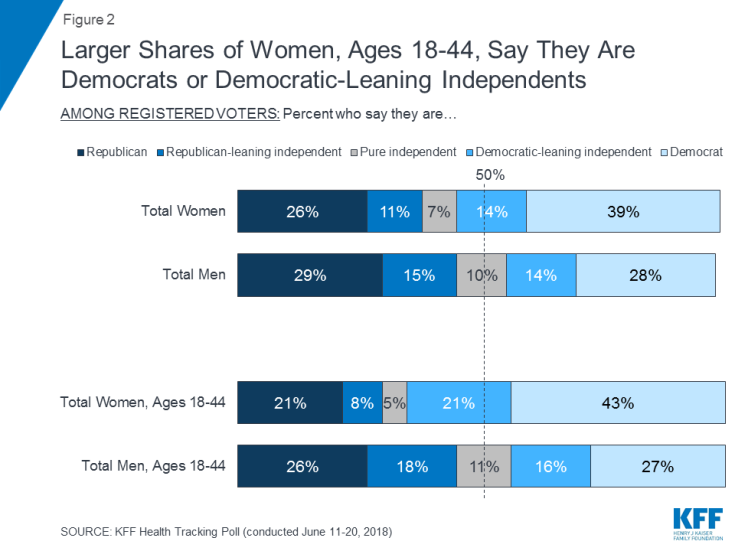
Figure 2: Larger Shares of Women, Ages 18-44, Say They Are Democrats or Democratic-Leaning Independents
Two-thirds (68 percent) of women voters, ages 18-44, disapprove (either “strongly” or “somewhat”) of the job President Trump is doing, as do 58 percent of women voters, overall.
Four in ten (39 percent) younger women voters (ages 18-44) say they are more enthusiastic about voting in this Congressional Election compared to previous ones. In fact, enthusiasm about voting in this year’s midterm election is much higher, across genders, than when compared to 2014 (the last midterm election cycle). Yet, more than twice as many of the younger group of women voters (18-44) say they are more enthusiastic about voting in this year’s election than said the same in 2014 (14 percent).
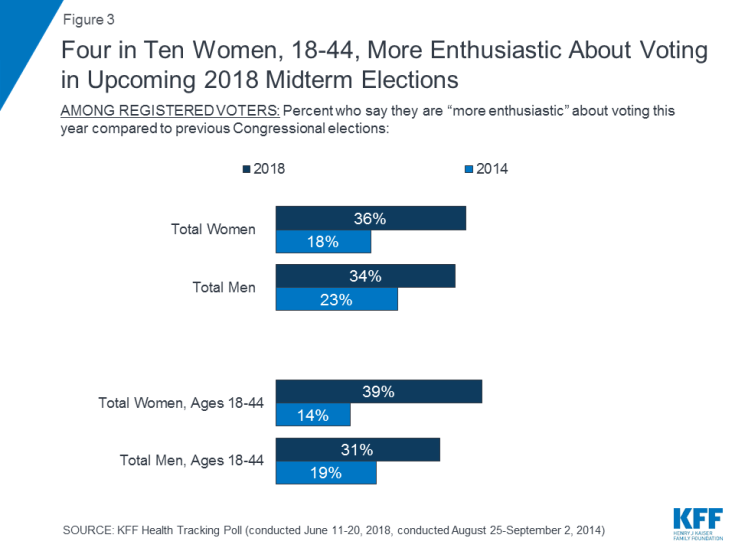
Figure 3: Four in Ten Women, 18-44, More Enthusiastic About Voting in Upcoming 2018 Midterm Elections
There are some partisan differences with about half of Democratic women voters (46 percent) saying they are “more enthusiastic” to vote in this year’s congressional elections compared to three in ten Republican and Republican-leaning women voters (28 percent).
Women Voters More Likely to Vote for Candidates who Support Key Women’s Issues
Overall, a majority of women voters, and women voters 18-44, say they are more likely to vote for a candidate who supports workplace policies predominantly aimed at women’s rights. Two-thirds of women voters say they are more likely to vote for a candidate who wants to enact stronger workplace protections such as harsher penalties for sexual harassment and assault in the workplace. This is larger than the share who say they are more likely to vote for a candidate who does not want to enact such protections (7 percent) or says a candidate’s position on this issue does not make a difference in their vote choice (24 percent).
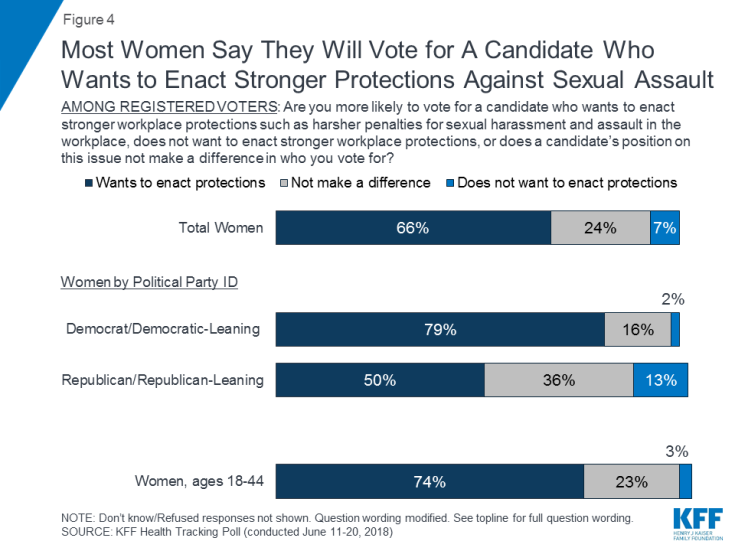
Figure 4: Most Women Say They Will Vote for A Candidate Who Wants to Enact Stronger Protections Against Sexual Assault
In addition, six in ten women voters (58 percent) and seven in ten women voters 18-44 (71 percent) say they are more likely to vote for a candidate who supports a law requiring employers to provide paid parental leave. Fewer, 5 percent (3 percent of women voters 18-44) say they are more likely to vote for a candidate who does not support such a law and 35 percent (26 percent of women voters 18-44) say it doesn’t make a difference.

Figure 5: Few Women Voters Say They Will Vote for A Candidate Who Does Not Support Paid Parental Leave
About half of women voters (54 percent) say that they are more likely to vote for a candidate who is an outspoken supporter of the international #MeToo movement, the campaign to raise awareness about sexual harassment and assault, while about one-third say a candidate’s stance on this movement does not matter to their vote. Once again, few women (7 percent) say they are more likely to vote for a candidate who does not address these issues.
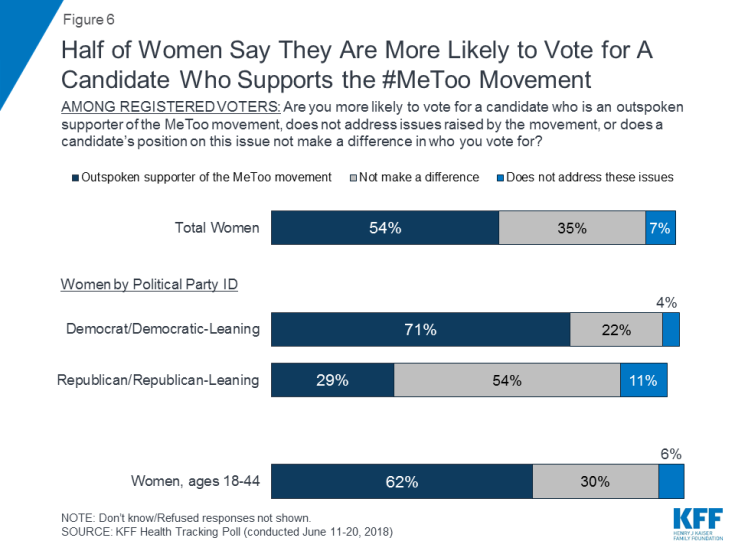
Figure 6: Half of Women Say They Are More Likely to Vote for A Candidate Who Supports the #MeToo Movement
Republican and Republican-Leaning Women Voters
All of these issues (workplace protections against sexual harassment and assault, paid parental leave, and the #MeToo movement) appear to be less of a voting concern for Republican and Republican-leaning women voters than their Democratic-leaning counterparts. About half of Republican and Republican-leaning women voters say a candidate’s position on #MeToo and paid parental leave will not make a difference in who they vote for, but larger shares say they are more likely to vote for a candidate who supports these policies than a candidate who opposes these policies.
The Role of Partisanship in Women’s Views toward Abortion Services
Women’s views on access to abortion services largely fall along party lines with large shares of Democratic and Democratic-leaning women voters saying they are more likely to vote for a candidate who supports access to abortion services (73 percent). On the other hand, nearly six in ten (58 percent) Republican and Republican-leaning women voters say they are more likely to vote for a candidate who wants to restrict access to abortion services. Six in ten (57 percent) women voters, ages 18-44, say they are more likely to vote for a candidate who supports access to abortion services.
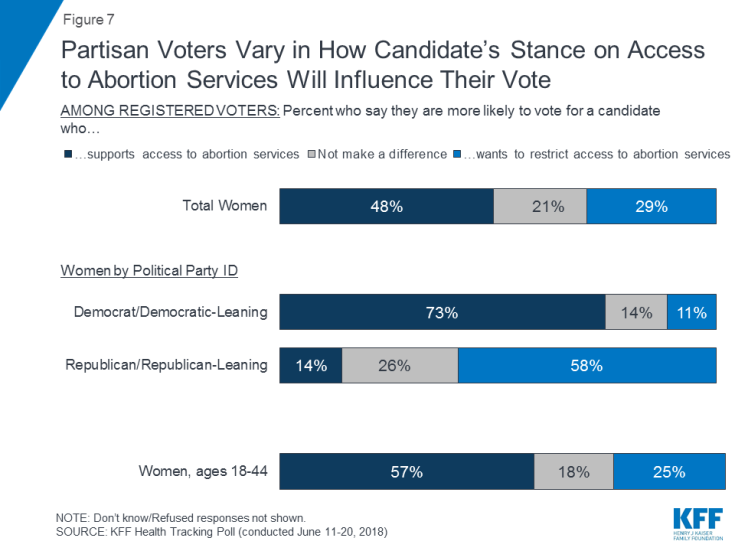
Figure 7: Partisan Voters Vary in How Candidate’s Stance on Access to Abortion Services Will Influence Their Vote
Republican Women Split on Roe v. Wade
Republican and Republican-leaning women overall and ages 18-44, are divided in their views of whether they want to see the Supreme Court overturn Roe v. Wade. About half of Republican and Republican-leaning women overall and ages 18-44 say they would like to see Roe v. Wade overturned (49 percent and 45 percent, respectively). A statistically similar share say they would prefer to see Roe v. Wade stay in place (48 percent and 53 percent, respectively). On the other hand, most Democratic women, regardless of age, do not want to see the 1973 Supreme Court decision overturned.
Large Shares of Women Support Federal Funding for Reproductive Health Services
Despite the partisan nature of views of Roe v. Wade, majorities of women – across age and party identification – say it is either “very important” or “somewhat important” the federal government provides funding for reproductive health services, such as family planning and birth control, for lower-income women. However, a much larger share (about eight in ten) of Democratic women (both overall and between the ages of 18 and 44) say this funding is “very important” than Republican women (44 percent of Republican women overall and 52 percent of Republican women between the ages of 18 and 44).
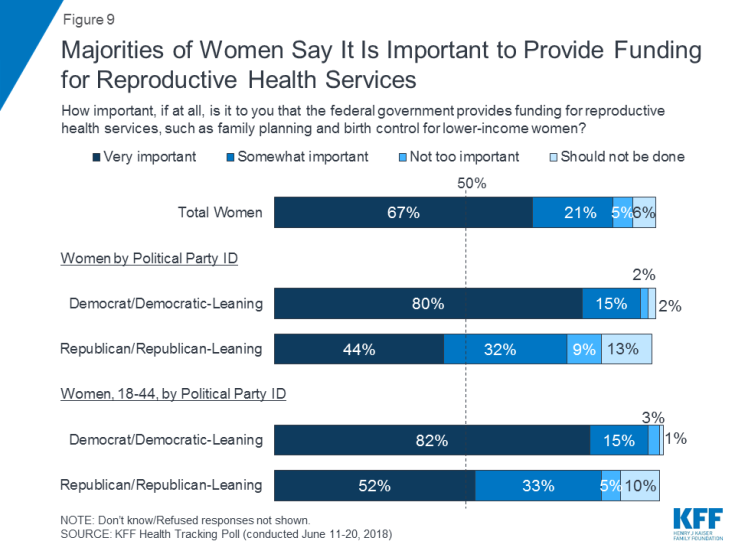
Figure 9: Majorities of Women Say It Is Important to Provide Funding for Reproductive Health Services
One-third of all women and four in ten women (39 percent) between the ages of 18-44 say they have ever visited a Planned Parenthood clinic for health care services.
Proposed Changes to The Federal Family Planning Program
The Trump Administration has recently proposed changes to rules about federal Title X family planning funding that helps pay for reproductive health care, contraception, and other preventive care services for low-income women. The new rule would prohibit federal family planning funding from going to organizations like Planned Parenthood that also provide abortion services, even if the funds themselves cannot be used to pay for abortions. Two-thirds of Democratic and Democratic-leaning women oppose these proposed changes to Title X funding while similar shares of Republican and Republican-leaning women say they support these proposed changes as say they oppose.
These proposed changes would also allow federal funding to go to organizations that do not discuss abortion when they counsel pregnant women about all of their pregnancy options in most cases. Most women, regardless of age and partisanship, oppose this proposed change.
The federal government also provides funding to reduce teen pregnancy to organizations that teach younger people about safer sex practices. When asked about whether they would support or oppose allowing federal funding to go to organizations that promote abstinence as the only option and do not teach young people about contraception and STD prevention, majorities of Democratic (81 percent) and Republican women (68 percent) say they are opposed to this proposed change. In addition, most women of reproductive age (between the ages of 18 and 44) also oppose this proposed change in policy.
Endnotes
Previous research has shown that one of the most important indicators of elections is how engaged one group of voters are compared to another group – known as the enthusiasm gap. The current enthusiasm gap in the June Kaiser Health Tracking poll indicates that women, particularly Democratic women, are unusually excited about the upcoming election. The researchers at KFF will continue monitoring this throughout the 2018 election cycle.
This month’s tracking poll was in the field during a time when there was increased attention to the Trump Administration’s policy to separate immigrant families and the subsequent change in policy.

